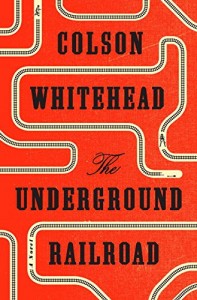 Published by Fleet UK, November 2016/ Doubleday US August 2016
Published by Fleet UK, November 2016/ Doubleday US August 2016
320pp, hardcover
Reviewed by Elsbeth Lindner
The grave, measured narration of celebrated writer Whitehead’s latest book – a controlled, horrific account of the hellish micro and macro worlds of slavery – arrives with few perceptible literary flourishes. Grimmer and more graphic than 12 Years a Slave, the novel begins as a reflection not merely of the oppression of black slaves by white owners but of a larger world of spies and slave catchers, informers and turncoats, abolitionists and campaigners.
But then, as the pages turn, so an additional dimension becomes apparent. While Whitehead’s larger context is ‘manifest destiny’, the self-serving white philosophy that lends supremacy and justification to the relentless business of stealing land, enslaving Africans and obliterating Native Americans, what begins traditionally turns stranger and more inventive.
Colson’s wide-angle lens continues to expose a wide world of devastating violence in which no one is safe, certainly not black escapees who may still be found and retrieved even if they reach the apparent security of the North. But the novel simultaneously moves beyond realistic history into another realm, one where the famed underground railway – a network of secret locations and courageous helpers who assist runaway slaves – becomes a real, complex network of train lines buried in tunnels below the surface, and states’ policies towards their black populace become horribly differentiated.
At times, both the specific railroad business and the novel as a whole take on the surreality of a joyless fairytale, an Alice in Wonderland tale transposed to hell. ‘What are you doing here?’ one station agent asks Cora, the book’s central runaway. ‘I’m a passenger, sir.’ ‘Don’t you know this station is closed?’
This bleak picaresque narrative is driven by Cora’s flight, following in the footsteps of her own mother, out of a Georgia plantation. Cora’s journey across many states is simultaneously her own voyage of self-discovery, transforming a wild girl into a survivor, but also a panorama of ill-treatment, an encyclopedia of abuse in dealing with ‘the negro question’. South Carolina, seemingly benign when first explored, is revealed to be running appalling experiments in race control. North Carolina, in contrast, is busily practising simple racial extermination.
Cora spends time with a slave catcher, Ridgeway, and experiences his amoral attitude to the work at hand so closely that her clothes are spattered with viscera. Later, on an Indiana farm where blacks live free, other voices discuss the longer-term yoked futures of the black and white races. In these expounding speeches, Whitehead can verge on the sententious, but the history he explores is so vicious that arguing against an occasional heightened tone hardly seems relevant.
Other voices interrupt Cora’s account, adding ballast, tying up loose ends, but it’s her anger, her growing insight and her determination that steer the novel. The end comes quickly but the story reaches forward. There’s some hope but not too much. Seen from the vantage point of now, that appears another coolly fitting judgement, to conclude this intriguingly inventive, devastating, epic novel.
